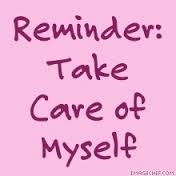 What does self care look like for you? We hear about it often. We even tell each other to take care of themselves as we think about our own self care. Does a self care routine matter?
What does self care look like for you? We hear about it often. We even tell each other to take care of themselves as we think about our own self care. Does a self care routine matter?
Many of us are caring for others as we care for ourselves. If we don’t take the best care of ourselves, it becomes more of a challenge to care for those we love.
We are living longer. Let’s preserve our life with the self care we deserve. Perhaps that means getting to bed a little earlier at night (without aid from television and other gadgets)
How does exercise fit into your daily schedule? Parking a little farther from stores while shopping may be an easy way to start. Getting up to stretch during commercials is almost effortless. There is most likely an exercise, dance, yoga or pilates class near you. Call and sign up.
As we venture outside to breathe in the fresh air, we become a part of the natural beauty that exists and watching nature will inevitably invite some self movement.
Our eating habits also influence our self care. Are we getting adequate fresh fruits and vegetables? Are we willing to try new vegetables or even prepare our foods differently from our normal methods? Baking, stir fry, and even some raw foods are surprisingly appealing and appetizing.
Let’s remember to include relaxation. That might be taking regularly scheduled time-outs. When is the last time you took a personal day for the most important person in your life? This is your special time for you to unwind. (read a book, meditate, take a nap, listen to music)
Self-care matters. It is essential for us to live our lives to the fullest and for us to be the best we can be for ourselves and for those that matter in our lives.
New Beginnings offers support for self care through one on one coaching, grief support (The Empty Chair) accountability partners (Stay on the Path) and more. The focus really is on you because you matter.
Don’t Worry; Be Happy
 When we stop worrying , that persistent repetitious thought process that leads to stress and keeps us from being as productive as we can be or more stressed than we need to be – our lives take on a favorable change.
When we stop worrying , that persistent repetitious thought process that leads to stress and keeps us from being as productive as we can be or more stressed than we need to be – our lives take on a favorable change.
Have you ever noticed as we stop worrying, a solution generally appears?
Remember the times when you told yourself to “sleep on it” and after a nap or another diversion, a feasible solution comes to mind?
Ask yourself
- Does worry make the issue disappear?
- Does worry make it better?
- What purpose does worrying serve?
The new #caregiver you reluctantly hired, that important presentation you are about to make, your or your loved ones retirement or medical benefits, even those lingering holiday pounds are all examples of worry. Knowing that we have prepared properly and asked for support and assistance for those tasks that seem overwhelming enables us to reach solutions to our challenges. Worry is alleviated.
As we think differently about our concerns, our lives and the lives of those around us flow with less effort and more ease. The process of taking action to solve our worries greatly improves the outcome.
Let’s focus on the good. There is always something good in every challenge. We become stronger and wiser. Take the time for #self care. Engage in activities that interest you. If it’s been a while or you have forgotten about those interests, reach out and try something new and different. Visit a new restaurant. Try a yoga class. Get motivated with dance instruction. Revive your artistic talents. Something new is always on the horizon with a cooking class. Explore mentoring in your community or volunteering for those who really appreciate your service.
Remember, don’t worry, be Happy.
Joy and light to you.
What Are Your Caregiver Boundaries
Remember boundaries from school and at home. “Don’t color outside the line. All assignments must be turned in before the second bell. Only ride your bike on this street. Be home before dark.” Why do we have boundaries?
As caregivers, we can probably think of many boundaries. How are these boundaries established? Who determines our boundaries or the boundaries of those for whom we are caring?
Boundaries are those areas that we determine will not be crossed for any reason. (most of the time) There are usually exceptions which lead to other exceptions. What happens to our boundaries?
On the caregiving journey, there are agreements with other family members. Perhaps it’s something as simple as a weekly day of relaxation for the primary caregiver. One week passes, with no respite. Another week passes which turns into months with no relaxation or “me time”. What happened to the boundary?
Do we remind our family member of this caregiving agreement? How important is it to each of us that the agreement is honored?
To avoid stress, overwhelm and eventually depression, it is essential to establish and maintain boundaries. This process involves, saying what we mean and meaning what we say. It’s about being direct.
What are your responsibilities as a caregiver? Are you performing all the tasks– Multi-tasking — laundry, cooking, cleaning, bill paying, scheduling medical appointments. Remember to set boundaries.
Delegate some of the responsibilities. Barter some of the services. You will be amazed to find that someone actually prefers to do something that you prefer not to. Constantly remind family members of your boundaries. It’s a part of your continual growth, health and well-being.
Reward yourself often because caregivers need care too.
